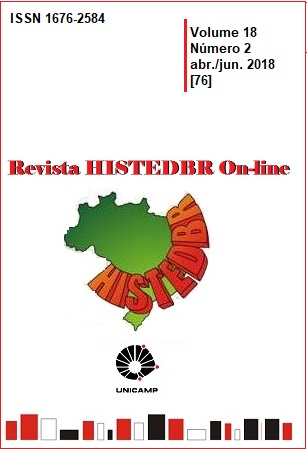Abstract
This study analyzes the Spiritual Exercises, which corresponds the Jesuit's first formation instrument, both because it was the first one formulated by Loyola, the founder of the Society of Jesus, and with which he recruited the first fighters, as also by corresponds to the initial phase in the formation of the Jesuit, without which he can not become a member of the Society of Jesus. Spiritual Exercises were studied in this research in its singularity of pedagogical work, although in this perspective we do not fail to consider that the didactic product belongs to a totality within its historical context, such as the transformations of the social structure of XVI century Europe that determined the new man's formation of that period and which were affected and affected the New World. The Spiritual Exercises are inscribed in the movement of changes necessary for the new order of production of existence, which requires a less contemplative man, more active in the defense and propagation of the Christian faith, and above all Catholic. However, in the New World, more specifically in portuguese America, the practice of spiritual exercises encountered difficulties due to their wild environment, totally different from that of the colonizers.
References
ARNAUT DE TOLEDO, C. A. Sobre o enchiridion militis christiani, de Erasmo de Roterdão. Acta Scientiarum. Human and Social Sciences, Maringá, v. 26, n. 1, p. 95-101, 2004.
BAINTON, R. H. Erasmo da cristandade. Lisboa: Fundação Calouste Gulbenkian, 1988.
BARTHES, R. Sade, Fourier, Loiola. Trad. Maria de Santa Cruz. Lisboa: Edições 70, 1979.
BENJAMIN, W. Origem do drama barroco alemão. Tradução, apresentação e notas: Sergio Paulo Rouanet. São Paulo: Brasiliense, 1984.
BERDIAEV, N. El sentido de la historia: experiencia de la filosofia del destino humano. Madrid: Encuentro, 1979.
BITTAR, M.; FERREIRA, A. A pesquisa em história da educação colonial. In: PAIVA, J. M.; BITTAR, M.; ASSUNÇÃO, P. (Org.). Educação, história e cultura no Brasil colonial. São Paulo: Arké, 2007.
CARVALHO, R. História do ensino em Portugal desde a fundação da nacionalidade, até o fim do regime de Salazar-Caetano. 3. ed. Lisboa: Fundação Calouse-Gulbenkian, 2001.
CONSTITUIÇÕES da Companhia de Jesus e normas e regras. São Paulo: Loyola, 1997.
DEMOUSTIER, A. L’originalité des exercices spirituels. In: GIARD, L.; VAUCELLES, L. de. (Dir.). Les Jesuítes à L’âge baroque (1540-1640). Grenoble: Edition Jeróme Millon er les auteurs, 1996.
FEBVRE, L. Au coeur religieux du XVI siècle, 2. éd. Paris: Bibliothéque Générale de L'École Pratique des Hautes Études, 1968.
FOUCAULT, M. Vigiar e punir. Nascimento da prisão. Tradução: Lígia M. Pondé Vassallo. Petrópolis: Vozes, 1977.
HERNANDES, P. R. A Companhia de Jesus no século XVI e o Brasil. Revista HISTEDBR [online], Campinas, n. 40, 2010. Disponível em: < http://www.histedbr.fae.unicamp.br/revista/edicoes/40/index.html >. Acesso em: 06 nov. 2017.
HERNANDES, P. R. Os exercícios espirituais da Companhia de Jesus e a educação. Revista HISTEDBR [online], Campinas: n. 30, p. 292-312. jun. 2008. Disponível em: < http://www.histedbr.fae.unicamp.br/revista/edicoes30/art18_30.pdf >. Acesso em: 06 nov. 2017.
LACOUTURE, J. Os jesuítas 1: os conquistadores. Tradução de Ana Maria Capovilla. Porto Alegre: L&PM, 1994.
LAUWERS, M. Verbete devotio moderna. In: LACOSTE, J. Y. (Dir.). Dicionário crítico de teologia. Tradução: Paulo Meneses. São Paulo: Paulinas; Loyola, 2004.
LEITE, S. História da Companhia de Jesus no Brasil. São Paulo: Loyola, 2004 (Tomo II).
LEITE. S. História da Companhia de Jesus no Brasil: século XVI – a obra. Belo Horizonte; Rio de Janeiro: Itatiaia, 2000a (Tomo II).
LEITE, S. História da Companhia de Jesus no Brasil: século XVI – o estabelecimento. Belo Horizonte; Rio de Janeiro: Itatiaia, 2000b (Tomo I).
LEITE, S. S. J. Cartas dos primeiros jesuítas do Brasil – 1553-1558. São Paulo: Comissão do IV centenário da cidade de São Paulo, 1954. v. 2.
LOYOLA, I. Autobiografia de Inácio de Loyola. Tradução e notas de Pe. Armando Cardoso, S. J. 3. ed. São Paulo: Loyola, 1987.
LOYOLA, I. Diário espiritual de Loyola, Inácio. Tradução e notas Pe. Armando Cardoso, S. J. São Paulo: Loyola, 1977.
LOYOLA, I. Exercícios espirituais. Orientação da tradução e anotações de Pe. Géza Kövecses S. J. 3. ed. Porto Alegre, 1966.
MANACORDA, M. A. História da educação da Antiguidade aos nossos dias. Tradução: Gaetano Lo Monaco. 12. ed. São Paulo: Cortez, 2006.
NASCIMENTO, S. F. do. “Erasmo e Lutero: o livre arbítrio da vontade humana”. Revista de Filosofia. Curitiba, v. 18, n. 23, p. 89-103, jul./dez. 2006.
O’MALLEY, J. Os primeiros jesuítas. Tradução: Domingos Armando Donida. São Leopoldo, RS: Ed. da UNISINOS; Bauru: Ed. da EDUSC, 2004.
SAVIANI, D. História das ideias pedagógicas no Brasil. 2. ed. Campinas, SP: Autores Associados, 2008. (Coleção Memória da Educação).
SKINNER, Q. Fundações do pensamento político moderno. Tradução: Renato Janine Ribeiro. São Paulo: Companhia das Letras, 1996.
STORCK, J. B. Do Modus parisiensis ao ratio studiorum: os Jesuítas e a educação humanista no início da Idade Moderna. História da Educação, Porto Alegre: UFRS, v. 20, n 48, p 139-158, jan./abr., 2016.
A Revista HISTEDBR On-line utiliza a licença do Creative Commons (CC), preservando assim, a integridade dos artigos em ambiente de acesso aberto.


